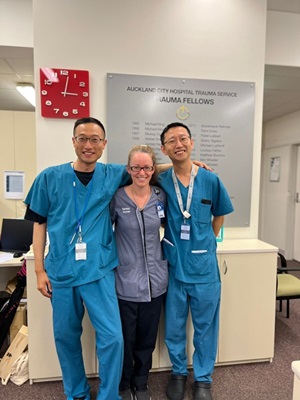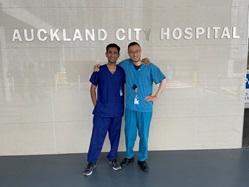2024 | Volume 25 | Issue 5
Author: Dr Victor Kong, MD, PhD, ChM, MSc, DRCPSC, MRCS, FRACS - Trauma surgeon

Dr Kong with Bridget Dwyer (trauma nurse)
and Dr Jono Zhou (trauma registrar)
Introduction
Every career path has its own challenges, and becoming a trauma surgeon is no exception. Looking beyond the years of surgical training, long working hours and constantly being in a high-stress environment, one often wonders why anyone would pursue such a career.
Trauma Surgery
At the most basic level, trauma refers to any physical injury that requires medical attention. Appropriate resuscitation, timely interventions and sound clinical decision-making are crucial to save a life. A wide spectrum of injuries, variety of procedures, critical decision-making in an ultra-fast paced environment and, most importantly, a large number of grateful patients who are literally brought back from the brink of death convinces me that no other surgical subspeciality inspires me as much as trauma surgery. Taking care of the most critically injured patients is my absolute privilege and one that I find extremely satisfying.
Subspecialist Fellowship training
Following completion of general surgical training via the Royal Australasian College of Surgeons—culminating in being awarded the title of FRACS—and deciding on which subspeciality training to pursue can be a challenging decision. Fortunately for me, it was simple—trauma surgery was the only field I ever wanted to pursue. Trauma surgery as a subspecialty is well established internationally, and a formal Fellowship training program now exists for surgeons in Aotearoa New Zealand. The program was established when I was a senior registrar. The Post Fellowship Education and Training Programme (PFET), under the auspices of the Australian and New Zealand Association for the Surgery of Trauma (ANZAST), trains surgeons to an international standard where they are regarded as specialists in the surgical care of the critically injured.
The ANZAST Fellowship
The ANZAST is a two-year Fellowship program that provides surgeons with a structured pathway on which to train as trauma surgeons within Australasia. I was fortunate to have been accepted onto the program, and subsequently completed my training, firstly at Waikato Hospital in Kirikiriroa Hamilton and then at Auckland City Hospital in Tamaki Makaurau Auckland, Aotearoa New Zealand. The two years passed by quickly and I gained a variety of technical and non-technical skills, including a deeper understanding of trauma care.
The training program was structured and well supported along with the academic and clinical requirements, which were realistic and well balanced. A unique aspect of the program was that I could develop my operative skills in parallel with other specialties that are relevant to trauma. Most of my speciality colleagues were fantastic and generous with their time in allowing me to learn their craft. For example, obstetricians took the time to teach me their tips and tricks in relation to performing caesarean sections—a valuable skill set that translates directly to performing perimortem caesarean sections in trauma. Other highlights included working and learning from colleagues in inter alia, Vascular Surgery, Neurosurgery, and Orthopaedics. My ethos has always been simple: if you are driven and motivated, you will look for the opportunities and there is always a way to learn and acquire the skills. I found it an extremely rewarding experience. It also stood me in good stead for the adventure that followed—working in Canada.

Dr Kong with Dr Sohil Pothiawala, visiting emergency physician from Singapore
Final thoughts
As the first general surgeon in Aotearoa New Zealand to have completed the ANZAST Fellowship program, I encourage young surgeons who are serious about pursuing a career in trauma surgery to embrace this opportunity. Trauma surgery itself is fascinating—it is incredibly exciting, immensely rewarding, and having the ability to be there and care for those who, by choice or otherwise, are injured is what I consider to be the greatest privilege of all as a trauma surgeon. Indeed, I often wonder why anyone would not consider pursuing such a career!